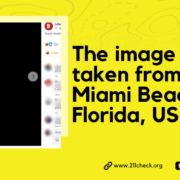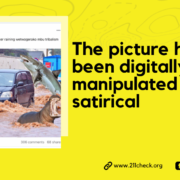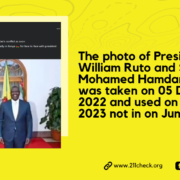Fact-check: Claims of “smoking” shrines and misattributed image in South Sudan
Claims that women use shisha to charm men in South Sudan are unproven, as the image accompanying them is an old image from Nigeria.
By 211 Check Desk
Recently, social media has been abuzz with unverified claims suggesting that women and men visit shrines to “smoke” individuals they are having affairs with to make them love them more in Juba, South Sudan.
As part of this online discussion, an image of a woman smoking shisha is being shared and falsely attributed to Juba, South Sudan, to validate these claims.
The image was posted on Facebook by a user and also on Twitter. The false claim attempts to validate the unproven belief that some individuals use supernatural means to manipulate their partners into loving them more. This practice has no scientific backing and should be treated with scepticism.

However, through a thorough investigation and reverse image searches, it becomes evident that the image is originally from somewhere other than South Sudan and has been circulating online since at least June 2016.
The results showed that the same picture had been used previously, the earliest in June 2016. It was found that the image was taken in Nigeria and has been used in various contexts unrelated to the claimed practice of visiting shrines to charm individuals and had nothing to do with South Sudan.

Besides, many more online sites used the picture in Nigeria, and these can be found here 1, 2, 3, 4 and 5. One of the articles was published with this picture by GistMania, an online blog from Nigeria, in 2016, authored by Kacy Lee.
The image gained virality and has chances of believability in South Sudan because of recent unverified news about women smoking shisha to win over the love and loyalty of men. Given the comments on the post shared by the South Sudanese blogs, the citizens believe the picture and the story to be accurate.
The claim that women visit shrines to charm men into loving them more is based on anecdotal accounts and lacks credible evidence or verifiable sources. It is essential to approach such claims critically and examine them based on factual information and reliable research. In this case, using an unrelated image to validate the claim further doubts its authenticity.
The location where the image was initially taken is Nigeria. It is essential to note that the image’s origin has no direct connection to South Sudan or the alleged practices being discussed. Misattributing images or using unrelated visuals to support a claim only spread misinformation and confusion. The claims of women visiting shrines to influence the emotions of individuals they are involved with need more substantiation from reliable sources. Credible evidence and expert testimonies make ascertaining these allegations’ truthfulness easier. It is crucial to approach such claims with scepticism and demand verifiable evidence before accepting them as factual. When examining cultural practices, it is essential to avoid generalisations or stereotyping. Like any other country, South Sudan has diverse cultural traditions and beliefs. Making sweeping statements about the practices of an entire nation or gender group without adequate research can perpetuate harmful stereotypes.
Conclusion:
211 Check finds the claim that women visit shrines to charm men into loving them more lacks credible evidence. The image circulated to validate these claims is originally from Nigeria, not South Sudan, and has been in circulation since at least June 2016.
To ensure accuracy and transparency, we at 211 Check welcome corrections from our readers. If you spot an error in this article, please request a correction using this form. Our team will review your request and make the necessary corrections immediately, if any.
It is crucial to fight against misinformation and disinformation in mainstream and alternative media by avoiding becoming a victim of fake news. To prevent the spread of false information, you must refrain from sharing content you are unsure about or unaware of its origin. Disinformation and misinformation can be incredibly dangerous because they can mislead people and cause harm. For instance, false information on health matters can lead to wrong decisions that can put people’s lives at risk. Therefore, it’s vital to fact-check information before sharing it to promote accurate and reliable information. Visit https://211check.org/ for more information on our fact-checking process, or send us a WhatsApp message at +211 917 298 255 if you want to present a claim. Our team will promptly respond to your request because we believe #FactsMatter.









Leave a Reply
Want to join the discussion?Feel free to contribute!